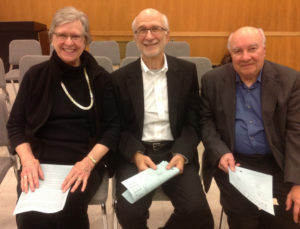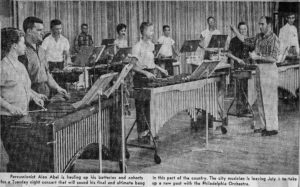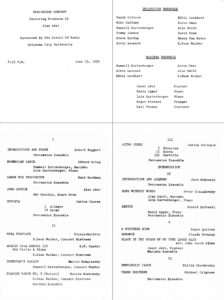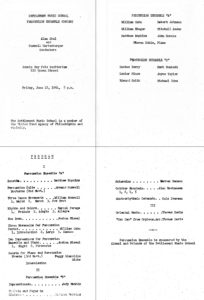
Mr. and Mrs. Abel with Russell
I have known Alan and Janet Abel for sixty-four years and every one of those years has been a blessing. Like so many others, I feel like they are my “second parents,” so the loss of Mr. Abel is much like losing a member of my own family. This story is a small tribute to Mr. and Mrs. Abel and their generous contribution to my life.
I was eleven years old when I had my first drum lesson with Mr. Abel. As I waited for my lesson to begin, Mrs. Abel gave me cookies to eat, just as she still does for all their students. Marianne and “little Alan”- Paul was not born yet – ran around the living room playing with Glockenspiel, their cat. Mr. Abel’s first teaching studio was the bedroom of the small house they rented in Oklahoma City and the only instruments in the room were two practice pads. They soon moved to a larger house with a garage that Mr. Abel converted into a teaching studio so he could include a marimba and two timpani in his teaching. In order for students to have an inexpensive mallet instrument to use for practice, he found a small two octave marimba with cardboard resonators in a yard sale that he bought for $10. Each student who learned marimba started with this instrument until they found a larger instrument they could afford to buy; they would then pass it on to the next student in line for $10. In order for each student to have a good pair of snare drum sticks, Mr. Abel matched pairs of Ludwig 2B and 1S sticks at the local Sharp & Nichols music store which were sold to his students for $1 a pair.
In my lessons, Mr. Abel played everything with me, providing the perfect template for learning. As I played, I would imitate the movement of his hands and try to duplicate the sound he produced. On a 5 x 8 pad of lined paper (he had not yet started to use 3 x 5 cards), he outlined my practice routine for each week, indicating how many minutes to practice each item in my required thirty minutes of daily practice. This disciplined approach worked well for me since I had never before done anything so structured, and I improved by following his instructions assiduously. One day in a lesson, after I had learned the single, double, and triple paradiddles, Mr. Abel said, “Just for fun, play all the paradiddles but play them randomly.” In other words, Mr. Abel was telling me to improvise using paradiddles. This was a challenge for me at first; I had to think for myself and my hands had to respond to my own instincts. This soon became my favorite exercise as I began to feel the metric shifts that occurred when I went from one paradiddle to another, and I still use it as a warm-up exercise. This was my first experience with improvised playing and improvisation is something that I have returned to throughout my life. The early concerts of Nexus were all free improvisations, and now in our fiftieth year we still include improvisations in our performances.
Mr. Abel used vocabulary in our lessons that was new to me. One word that he used frequently was enhance. He said I should make sounds that enhance the music, meaning to improve the quality of it. He also told me I should try to make what I play fit the music and should always “follow the line” of the music. Mr. Abel’s approach to pedagogy included more than technical and musical development. Just as his playing style gave me a model to follow in developing sound, touch, and musicianship, his character and integrity showed me how to live a life of meaning and principle. My older sister, Doris, kept a scrapbook of my musical activities and in an early entry she wrote, “One of the finest things that happened to Russell was becoming acquainted with Alan Abel. Besides the tremendous help he was to Russell musically, he was an inspiration as a man. His fine character and high ideals helped Russell to develop spiritually and morally while he was learning musically.”
Mr. and Mrs. Abel are deeply spiritual people, and as it turned out, they attended the same church as my family. The First Presbyterian Church had a remarkable music program led by John and Helen Kemp, both graduates of Westminster Choir College in Princeton, NJ. In addition to the regular services at the church, the Kemps programmed special concerts with choir and orchestra to perform pieces such as Walton’s Belshazzar’s Feast, Britten’s Noye’s Fludde, and Orff’s Carmina Burana. Mr. Abel and I were the percussion section for some of these concerts, and I learned how to prepare and perform music by playing alongside him. The most special performances at the church were the midnight Christmas Eve candlelight services. We played chimes and glockenspiel for the Christmas carols using arrangements that Mr. Abel wrote, and he signalled the approach to midnight by playing the Westminster chime melody followed by twelve chime notes ending exactly at midnight. He had me motion to him on the twelfth chime note to confirm he counted correctly.

When Mr. Abel won the position as percussionist with the Philadelphia Orchestra, he organized a farewell tribute to Oklahoma City by presenting a percussion ensemble concert with his advanced students. The concert included Mrs. Abel as the featured vocalist in music he arranged for percussion and voice. The concertmistress and marimba soloist for the performance was K. Dean Walker, Mr. Abel’s most accomplished student. K. Dean would eventually be appointed Principal Percussionist in the Oklahoma City Symphony, becoming one of the first women in North America to hold a principal percussion position. This concert is still at the top of my list of the most meaningful concerts I have ever played. At that point in my life, I didn’t even know what a percussion ensemble was. Little did I know at the time that this introduction to percussion ensemble playing that Mr. Abel gave me would sow the seed of a lifetime of percussion chamber music performance with Nexus and the Steve Reich Ensemble.

It was a big adjustment for me when the Abels moved to Philadelphia, but Mr. Abel didn’t forget about me. He wrote me letters describing how they had “K. Zildjian cymbals – not A. Zildjian” in the orchestra. He told me how he would come to rehearsals an hour early to tune down the bass drum a half turn at a time until he reached the sonority that he liked. He thought they were tuning it too tightly and he preferred a lower pitch to fit the warmth of the Philly sound. When I was in the tenth grade, my English teacher, Mrs. Thomas, gave the class an assignment to write an essay describing the occupation we each intended to pursue. I wrote Mr. Abel with the questions Mrs. Thomas gave us to use as an outline and he answered every question. You can read “our” essay here:
When it came time for me to follow my dream and go to music school, Mr. Abel told me about The Curtis Institute of Music and the percussion teacher, Fred D. Hinger, who was the timpanist in the Philadelphia Orchestra. I auditioned and was lucky enough to be accepted into the school. In fact, I was doubly lucky because I not only had wonderful instruction in my lessons with Mr. Hinger, but I was invited by the Abels to come to their house for dinner every few weeks. Before dinner, Mr. Abel, Marianne, Alan, Paul, and I would often go to a nearby park for a friendly, but competitive, game of touch football. The dinners were always followed by several hours in Mr. Abel’s infamous basement studio working on excerpts, making sticks, and seeing what new projects Mr. Abel had on the go. It was during this period that Mr. Abel developed his well-known triangle, and I was lucky enough to get an Abel triangle from the first batch that he made. He was also working on his design for the suspension bass drum “Abel cradle” at that time.
Mr. Abel taught at the Settlement Music School in south Philadelphia and he arranged with Sol Schoenbach, the director of the school, for me to teach there. I taught the beginning students until they showed enough promise to study with Mr. Abel, and I also taught Mr. Abel’s students when he was on tour with the orchestra. My “B” percussion ensemble joined with Mr. Abel’s “A” ensemble for all the concerts. There were several people in these ensembles who moved on to illustrious musical careers, including John Soroka, Mark Sunkett, and Michael Udow. It was here that I first met my dear friend and future Nexus colleague, Bill Cahn. I was quite impressed with Bill who was not only an excellent percussionist but was adept at building instruments and composing music that we played in the Settlement percussion ensembles. The feeling of respect that Bill and I had for each other was something that was engendered by Mr. Abel and is an example of the relationships among all the members of Nexus that has allowed us to stay together and prosper for so many years.

I graduated from Curtis at the height of the Vietnam War, and as many other music students did at the time, I auditioned for the service bands in Washington, D.C. I was accepted into the United States Air Force Band, conducted by Colonel Arnald Gabriel (who I recently discovered was in an artillery unit that stormed Omaha Beach on D-Day). As it turned out, Mr. Abel also played under Col. Gabriel when he was stationed at Sampson Air Force Base near Rochester, NY after he graduated from Eastman. The three of us were together in Washington for the celebration of Col. Gabriel’s promotion from Lieutenant Colonel to “bird” Colonel. During my time in the Air Force, I once again studied with Mr. Abel while earning a Master’s Degree at Catholic University. I traveled to Philadelphia every few weeks for lessons, but Mr. Abel, being the devoted teacher that he was, made the trip down to Washington for my graduation recital.
After my discharge from the Air Force, I began work on a PhD in World Music at Wesleyan University in Middletown, CT studying music from India, Indonesia, and West Africa. In my first year at Wesleyan, Mr. Abel was on tour with the Philadelphia Orchestra in New Haven, and I invited him to come to Wesleyan on his morning off to visit some of my classes. He attended our Javanese gamelan rehearsal, then came to my tabla lesson. I had been at Wesleyan only a few weeks, and I was still learning the basic strokes on tabla. My teacher, Sharda Sahai, had just come to the United States that fall and spoke very little English, so it was difficult for him to communicate exactly what he wanted me to do. At one point in my lesson, with Mr. Abel sitting and watching, Sharda tried to get me to position my fingers a certain way on the drums in order to play a stroke correctly. I wasn’t doing it right and finally Mr. Abel said, “Turn your wrist to the right and move your index finger closer to the edge of the black spot.” I followed Mr. Abel’s instructions and Sharda nodded his head in approval, pointed to Mr. Abel and said, “Good teacher! He knows your hands!”
The 1998 celebration for Mr. Abel’s retirement from the Philadelphia Orchestra was a momentous event with many of his colleagues and former students in attendance. The highlight of the party was Don Liuzzi’s film montage of the great Philadelphia Orchestra percussionists from Oscar Schwar to the present. I was there with two of my Nexus partners, John Wyre and Bill Cahn, and we began the festivities by using Bill Reamer rope drums to play the street beats that Mr. Abel composed for my high school percussion section. I later used these street beats in a composition titled Cadence that was commissioned by Phil O’Banion for the Temple University percussion ensemble and dedicated to Mr. Abel.
A few years ago, Michael Udow organized a week of workshops and concerts at the University of Michigan. Mr. Abel and I were guests, thus bringing together four generations in the lineage of Alan Abel students. A bonus for me and my wife, Bonnie, is that we spent a week in a hotel in Ann Arbor right next to the Abels. Every morning we would have breakfast together in the dining room of the hotel, and at the end of our meal, Mrs. Abel would joyfully gather up all our dishes, stack them neatly, and place them at the edge of our table so it would be easy for the server to reach them. Bonnie and I enjoyed watching Mrs. Abel’s simple gesture that made life a little more comfortable for another person. To this day, when Bonnie and I dine at a restaurant, one of us takes on the role of “Mrs. Abel” and dutifully stacks our dishes and places them at the edge of the table in hopes that we, too, might make someone’s life a bit more pleasant.
In 2016, I retired from forty-two years of teaching at the University of Toronto. Beverley Johnston, who is a former student of mine and now on the percussion faculty at the U. of Toronto, organized the concert/ceremony and invited Mr. and Mrs. Abel to attend. They were kind enough to oblige and Mr. Abel made a heartwarming speech at the event. He also participated in a mass snare drum roll marathon of many of my former students to commemorate an event we held annually at the Faculty of Music called the Snare Drum Olympics. Mr. Abel, of course, is the gold medal winning snare drummer of all time. His performances at PASIC with the Emeritus Percussion Section, including his final one in 2019, are legendary.
The last time I met with Mr. Abel was at his 90th birthday party at Temple University, organized by Phil O’Banion and Chris Deviney. Mr. Abel was as energetic and effusive as ever. He was excited to tell me that he had met with a student earlier in the week and discovered a new way to play the tambourine part in Danse Russe Trepak. It was this kind of commitment and enthusiasm that he had all his life in his performing and teaching that is an inspiration to us all.
When I was in junior high school, a friend of mine who was also studying with Mr. Abel, said to me, “What if Mr. Abel is in the audience of our concert tonight?” I don’t remember what my response was although I was nervous at the prospect. For many years I thought about this question with trepidation before every concert I played. I hoped I was playing the way Mr. Abel taught me to play and I wanted him to be proud of me. Mr. Abel might not be with us now, but I know that he is watching what I do and what all his hundreds of students are doing as we try to enhance the music and our lives. I hope he is proud of all of us.

You write so beautifully Russell. Thank you for this piece. I was very touched by it. Bill Brennan